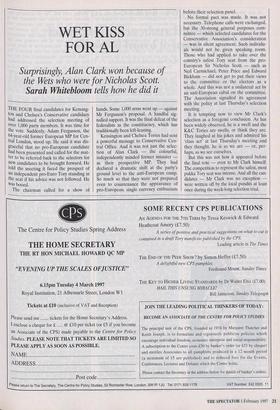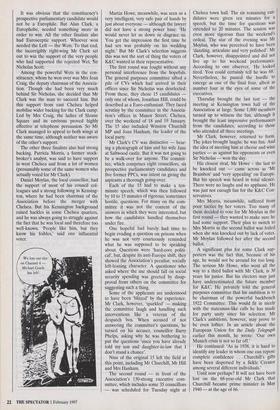WET KISS FOR AL
Surprisingly, Alan Clark won because of the Wets who were for Nicholas Scott.
THE FOUR final candidates for Kensing- ton and Chelsea's Conservative candidacy had addressed the selection meeting of over 1,000 party members. It was time for the vote. Suddenly, Adam Fergusson, the 64-year-old former European MP for Cen- tral London, stood up. He said it was dis- graceful that no pro-European candidate had been presented and called for the mat- ter to be referred back to the selectors for new candidates to be brought forward. He told the meeting it faced the prospect of an independent pro-Euro Tory standing in the seat if his advice was not followed. He was booed.
The chairman called for a show of hands. Some 1,000 arms went up — against Mr Fergusson's proposal. A handful sig- nalled support. It was the final defeat of the federalists in the constituency, which has traditionally been left-leaning.
Kensington and Chelsea Tories had sent a powerful message to Conservative Cen- tral Office. And it was not just the selec- tion of Alan Clark — the colourful, independently minded former minister as their prospective MP. They had declared a dramatic shift at the party's ground level to the anti-European camp. So much so that they were not prepared even to countenance the appearance of pro-European, single currency enthusiasts before their selection panel.
No formal pact was made. It was not necessary. Telephone calls were exchanged, but the 30-strong general purposes com- mittee — which selected candidates for the Conservative Association's consideration — was in silent agreement. Such individu- als would not be given speaking room. Those who had applied to take over the country's safest Tory seat from the pro- European Sir Nicholas Scott — such as Neil Carmichael, Peter Price and Edward Bickham — did not get to put their views to the committee or the electors as a whole. And this was not a unilateral act by an anti-European cabal on the committee. The Association signalled its agreement with the policy at last Thursday's selection meeting.
It is tempting now to view Mr Clark's selection as a foregone conclusion. As has been widely observed, he is a swell and the K&C Tories are swells, or think they are. They laughed at his jokes and admired his `class act' at last Thursday's meeting and they thought, he is as we are — or, per- haps, as we see ourselves.
But this was not how it appeared before the final vote — even to Mr Clark himself. The competition to represent the safest, most pukka Tory seat was intense. And all the can- didates — Mr Clark was no exception were written off by the local pundits at least once during the week-long selection trial. It was obvious that the constituency's prospective parliamentary candidate would not be a Europhile. But Alan Clark, a Europhobe, needed something more in order to win. All the other finalists also had Eurosceptic support. Whoever won needed the Left — the Wets. To that end, the incorrigibly right-wing Mr Clark set out to win the support of the very people who had supported the rejected Wet, Sir Nicholas Scott.
Among the powerful Wets in the con- stituency, whom he won over was Mrs Jean Craig, the deputy chairman of the Associa- tion. Though she had been very much behind Sir Nicholas, she decided that Mr Clark was the man to succeed him. But this support from east Chelsea helped mobilise wider backing for the Clark camp. Led by Mrs Craig, the ladies of Sloane Square and its environs proved highly effective at telephone persuasion. So Mr Clark managed to appeal to both wings at the same time, although neither was aware of the other's support.
The other three finalists also had strong backing. Patricia Morris, a former stock- broker's analyst, was said to have support in west Chelsea and from a lot of women (presumably some of the same women who actually voted for Mr Clark).
Daniel Moylan, the local councillor, had the support of most of his council col- leagues and a strong following in Kensing- ton, where he had been chairman of the Association before the merger with Chelsea. But his Kensington background raised hackles in some Chelsea quarters, and he was always going to struggle against the fact that he was local and therefore too well-known. 'People like him, but they know his foibles,' said one influential voter. Martin Howe, meanwhile, was seen as a very intelligent, very safe pair of hands by just about everyone — although the lawyer did not have a strong power base: 'He would never let us down or disgrace us. You get the impression the first time he had sex was probably on his wedding night.' But Mr Clark's selection suggests this was not the sort of thing the voters of K&C wanted in their representative.
The first round was fought without any personal interference from the hopefuls. The general purposes committee sifted a pile of CVs which had arrived in their offices since Sir Nicholas was deselected. From these, they chose 15 candidates — only one of whom, Jonathan Hill, could be described as a Euro-enthusiast. They faced scrutiny by the committee in the Associa- tion's offices in Manor Street, Chelsea, over the weekend of 18 and 19 January. The 15 also included Winston Churchill MP and Joan Hanham, the leader of the local party.
Mr Clark's CV was distinctive — bear- ing a photograph of him and his wife Jane at Saltwood castle. But it was not going to be a walk-over for anyone. The commit- tee, which comprises eight councillors, six prospective parliamentary candidates and five former PPCs, was intent on giving the aspirants a thorough going-over.
Each of the 15 had to make a ten- minute speech, which was then followed by 10 to 15 minutes of rigorous,'sometimes hostile, questions. For many on the com- mittee it was not the content of the answers in which they were interested, but how the candidates handled themselves under fire.
One hopeful had barely had time to begin evading a question on prisons when he was not very courteously reminded what he was supposed to be speaking about. Questions were 'hard-core politi- cal', but, despite its anti-Europe shift, they showed the Association's peculiar, socially left-leaning character. A questioner who asked where the axe should fall on social security spending was greeted by disap- proval from others on the committee for suggesting such a thing.
Some of the applicants are understood to have been 'blitzed' by the experience. Mr Clark, however, 'sparkled' — making the committee laugh and handling such interventions like a veteran of the despatch box. When accused of not answering the committee's questions, he turned on his accuser, councillor Barry Phelps, asking why he was bothering to put the questions 'since you have already told my son and daughter-in-law that I don't stand a chance'.
Nine of the original 15 left the field at this point, including Mr Churchill, Mr Hill and Mrs Hanham.
The second round — in front of the Association's 130-strong executive com- mittee, which includes some 35 councillors — was scheduled for Tuesday night at Chelsea town hall. The six remaining can- didates were given ten minutes for a speech, but the time for questions was extended to 20 minutes. The session was even more rigorous than the weekend's ordeal. The star of the evening was Mr Moylan, who was perceived to have been `dazzling, articulate and very polished'. Mr Clark, however, disappointed and did not live up to his weekend performance. According to one observer, 'He looked tired. You could certainly tell he was 68! Nevertheless, he passed the hurdle W emerge as one of the final four, albeit as number four in the eyes of some of the executives.
Thursday brought the last test — the meeting at Kensington town hall of the Association at large. Some 1,000 members turned up to witness the fun, although it brought the least impressive performances from the candidates, according to those who attended all three meetings.
Mr Clark, however, returned to form. The jokes brought laughs; he was fun. And the idea of meeting him at cheese and wine parties — as against his opponents or even Sir Nicholas — won the day.
His closest rival, Mr Howe – the last to be knocked out — came across as `Mr Brainbox' and 'very appealing' on Europe. But his speech was heard in total silence. There were no laughs and no applause. He was just not enough fun for the K&C Con- servatives.
Mrs Morris, meanwhile, suffered from poor tactics by her voters. Too many of them decided to vote for Mr Moylan in the first round — they wanted to make sure he had some support. Their plan to switch to Mrs Morris in the second ballot was foiled when she was knocked out by lack of votes. Mr Moylan followed her after the second ballot.
A significant plus for some Clark sup- porters was the fact that, because of his age, he would not be around for too long. The serious Mr Howe, who went all the way to a third ballot with Mr Clark, is 30 years his junior. But his electors may just have underestimated the future member for K&C. He privately told the general purposes committee that his ambition is to be chairman of the powerful backbench 1922 Committee. This would fit in nicely with the statesman-like calls he has made for party unity since his selection, Mr Clark's ambitions, however, may prove to be even loftier. In an article about the European Union for the Daily Telegraph earlier this month, he wrote: 'Our own Munich crisis is not so far off.'
He continued: 'As in 1938, it is hard to identify any leader in whom one can repose complete confidence . . . Churchill's gifts have been dispersed by a fickle Creator among several different individuals.'
Until now perhaps? It will not have been lost on the 68-year-old Mr Clark that Churchill became prime minister in May 1940 — at the age of 66.



























































 Previous page
Previous page